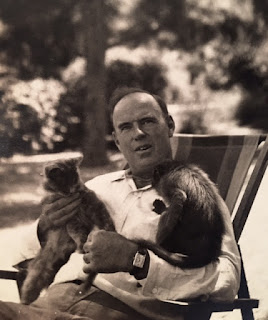Finding The Path
I have discovered that my grandfather (born in 1896) was a Princeton
classmate of F Scott Fitzgerald (also born in 1896). I should have known this.
And in fact, he mentioned once when cautioning his grandchildren not to take on
too many distractions in college that he’d told Scott Fitzgerald the very same
thing. To wit: “drop something or drop out.” Fitzgerald decided ultimately on
the latter. I should have put two and two together and arrived at the fact that
Pa had attended college with this great American author.
While I found several points of similarity, there were
important differences between these two men. My grandfather took time from school to serve as a 2nd
Lieutenant in France during WWI, finishing his Princeton degree when he
returned (thankfully) in 1918. Fitzgerald left Princeton around the same time,
but largely because he was doing so poorly in his studies. Fitzgerald
reportedly floundered a bit and then took a commission as a 2nd
Lieutenant, but failed to finish preparation for his post before the war ended.
Fitzgerald observed more than once that he was grieved not to have served
abroad. I suspect my grandfather was grieved that he did.
Without seeming to draw comparisons between the two men’s
capacities as writers, I will say that I find these similarities in personal
stories – as well as the differences – to be compelling. My grandfather loved
to write, closing one of his loving and eloquent letters to his eldest granddaughter
with the confession: “You don’t need any advice, I just needed to write.” He
wrote several unpublished manuscripts, saving them carefully, but instructing
my mother to “DAD” (Destroy After Death). Here was a man who loved to write,
who had a gift with the written word and who seemed again and again to be
denied his life’s creative passion.
As I do the uncomfortable work of reaching for my own
creative identity, I’m struck by a couple of things. What was it like for Pa to
write and send to publishers a manuscript when one of your college classmates was one of the most celebrated
authors of the age? I hope that he didn’t feel eclipsed by Fitzgerald’s
celebrity and talent. How would Pa’s life have been different if he had not
taken time from his university studies to fight in the War to End All Wars? Perhaps
if Pa had not gone to fight in WWI he’d have had a different professional
trajectory. And thank God he returned, as so many hundreds of thousands of
soldiers did not. Perhaps if Fitzgerald had gone to war, the world would never
have seen The Great Gatsby or Tender is the Night.
Here's the thing: somewhere along the way, my grandfather
was influenced by his “failure” to publish. He might have even been influenced
by his classmate’s powerhouse talent and weighted it against his own quieter
version of skill. Pa wrote beautiful letters to the family he had helped
create. He wrote persuasively on behalf of friends and family who needed
advocacy or informal counsel. He absolutely created for himself and his family a
very colorful life. But did he realize his mission? Did he fulfill his life’s
calling? Is my mission in life defined by what I’m doing or by what I’m called
to do? And as The Girl prepares to set out on her own journey, how do I
encourage her to follow her intuition, to follow where her dreams would lead
her when I’m quaking at the thought of such a bold directive?
I think that as I seek guidance for The Girl, and as I
consider my own next steps, I’ll take into consideration the wisdom of a
brilliant, unpublished author, SD Sherrerd, who wrote in 1974: “You will
have decisions to make. I find it comforting that in our complex culture the
wise road is almost always plain to see.”
I’ll keep my eyes and my heart open. And I’ll trust that I see my path.
Pa in about 1943. He's holding Jocko the spoiled monkey in one arm and
Princess the cat in the other.



Comments
Post a Comment